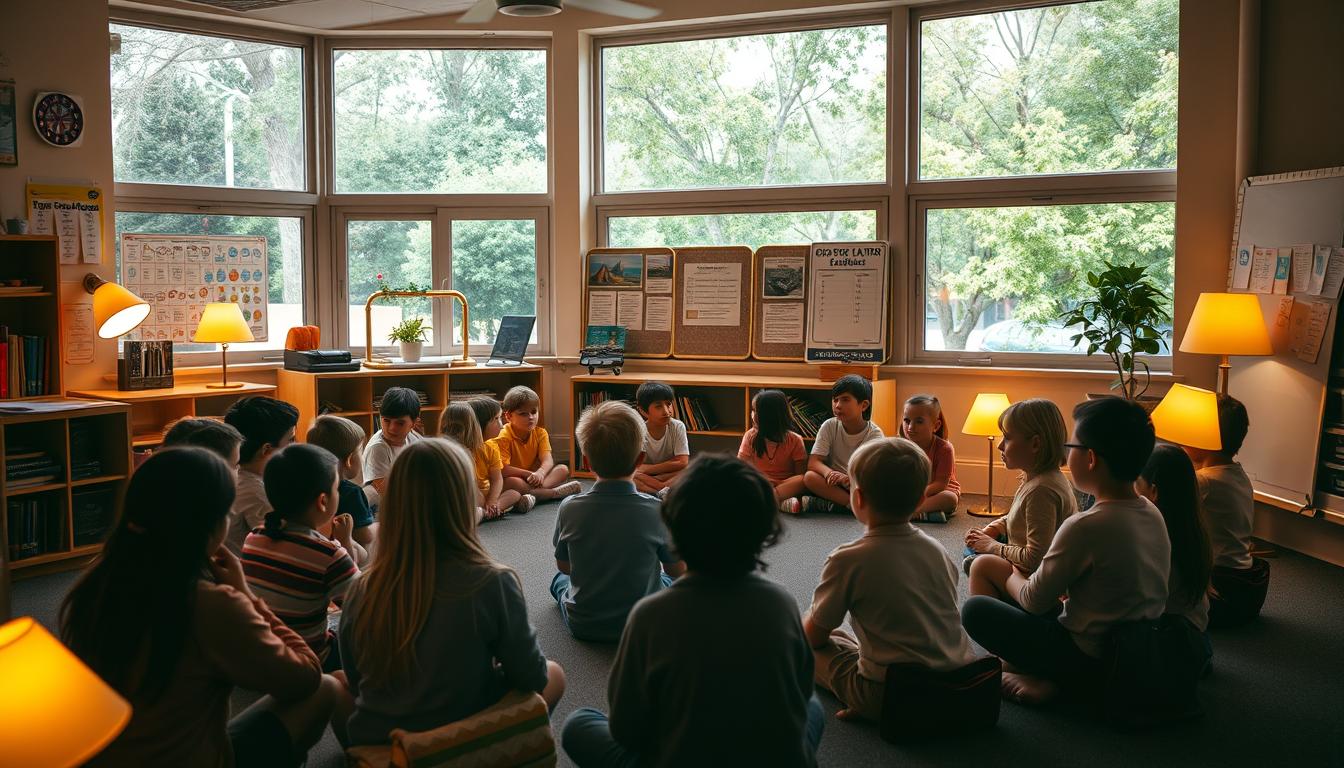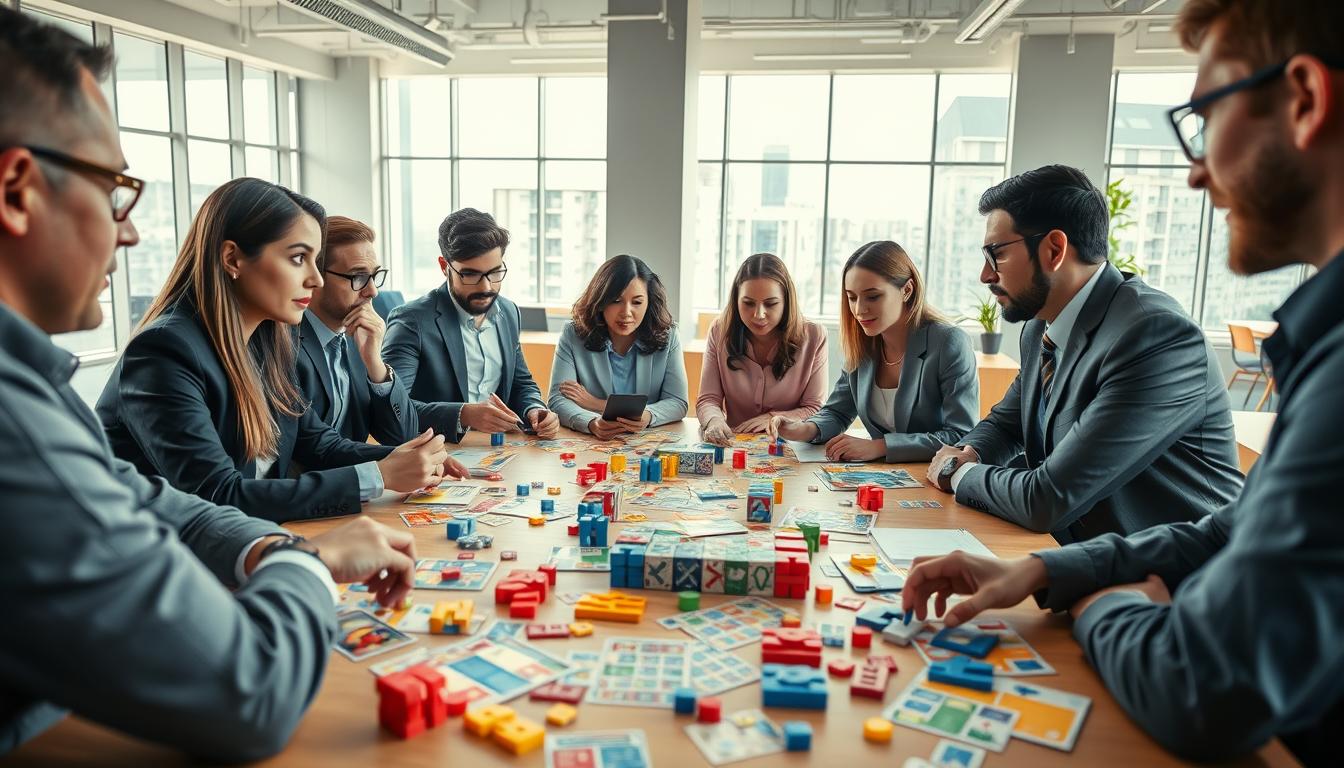Educational games to strengthen auditory memory in noisy environments
Have you ever wondered how kids learn in noisy places? In today’s world, where distractions are everywhere, it’s key to boost auditory memory. Educational games that focus on this can make learning fun and help improve listening skills.
These games are especially helpful for kids who struggle with hearing. They can make a big difference in how well a child does in school and with friends. Let’s look at some fun games that can help your child listen better, even when it’s loud.
Understanding Auditory Processing
Auditory processing is key to how we make sense of sounds around us. It’s about how our brains handle sounds, speech, and language. This is the foundation for good communication.
Children often struggle with this, leading to problems with hearing differences in sounds. This can make it hard to follow directions, remember what was said, or tell similar sounds apart.
In school, understanding sounds is vital for learning and staying engaged. If a child’s auditory processing isn’t working right, they might fall behind. Special activities can help improve their skills and boost their grades.
Teachers and parents can help kids get better at handling complex sounds. This helps them understand more deeply and communicate better in daily life.

Importance of Auditory Memory for Children
Auditory memory is key for kids’ growth. It helps them talk well, listen to instructions, and remember things. This memory is vital for learning and getting along with others.
Good auditory memory lets kids understand language better. This means they can learn and remember more. Doing things that help improve this memory is great for their brains.
When kids get better at handling sounds, they feel more confident. They can follow directions better and remember stories. Helping kids with their auditory memory is important for their development.

Challenges in Noisy Environments
Noisy places are tough for kids with hearing problems. The noise makes it hard for them to pick out certain sounds and understand speech. This leads to kids having trouble listening, which can be really frustrating.
In classrooms or homes with lots of noise, kids might find it hard to join in talks or follow instructions. This can make learning more difficult for them.
Parents and teachers need to understand how noise affects kids’ confidence and self-esteem. Giving kids quiet time or finding ways to reduce noise can help a lot. Ideas include using materials that soak up sound or letting kids wear headphones to block out loud noises.
How Games Improve Auditory Skills
Playing specialized games boosts auditory skills in a fun way. Kids learn through play, practicing sound recognition and retention. This approach makes learning enjoyable and stress-free.
Games that focus on hearing help kids grow mentally. They improve their ability to focus and understand what they hear. By doing tasks like identifying sounds, kids get better at processing sound in a relaxed setting.
Through games, kids get better at hearing different sounds and following instructions. This mix of learning and fun boosts their hearing skills. It also helps them grow in other areas of thinking, showing games are great for learning.
Types of Auditory Memory Games
Exploring different auditory memory games can help improve important listening skills. These games focus on sound discrimination and remembering stories. They make learning fun and engaging for kids.
Sound Discrimination Activities
Sound discrimination games help kids tell sounds apart. For example, Sound Bingo asks players to spot different sounds, like a drumbeat versus a piano note. Guess the Sound is another game where players match sounds with pictures. These games make listening skills sharper and boost brain power.
Story Recall Games
Story recall games are great for improving memory. They ask kids to remember details from a story, boosting listening and speaking skills. Games like retelling a story or answering questions about it make listening and speaking better. They also make kids more aware of the stories they hear.
Educational Games to Enhance Listening Skills
Educational games are key in boosting listening skills in kids. They make learning fun and engaging. Games like Hullabaloo require kids to follow audio cues, helping them focus on specific sounds.
This active play not only makes learning enjoyable but also sharpens their ability to process sounds.
Simon Says is another great game for improving listening. It teaches kids to listen carefully and follow instructions. This game helps them learn to distinguish between different sounds and respond correctly.
Playing these games regularly helps kids practice and get better at listening. It creates a fun learning environment where they can improve their listening skills.
Auditory Memory Games to Try at Home
Adding auditory memory games to home activities makes learning fun for kids. Games like Simon Says and the Telephone Game boost listening skills. They also add to the fun.
Simon Says with a Twist
Simon Says with a Twist makes the classic game more active. Kids have to listen well and act fast. This game sharpens their listening and memory skills.
It keeps kids excited because they must listen carefully and move quickly. This makes the game more challenging and fun.
Telephone Game for Listening Skills
The Telephone Game improves memory and speaking skills. Players pass on a message, trying to keep it clear. It’s hard because there are distractions.
This game teaches kids to listen carefully. They must catch every word to pass on the message right.
Incorporating Motor Skills with Auditory Games
Adding motor skills to auditory games boosts kids’ physical and brain growth. Games that mix listening with movement grab their attention and help them learn. For instance, Musical Chairs makes kids move around chairs based on sounds, improving their hearing and coordination.
Directed Drawing is another great way. Kids listen to directions and draw at the same time. This mix of creativity and listening helps them follow instructions better and improves their motor skills. It shows how games can help kids not just hear but also act on what they hear.
Using motor skills with auditory games is a complete way to learn. It engages kids’ senses, helping them remember better. This way, they make real-life connections through better coordination and hearing.
Multisensory Approaches to Auditory Learning
Multisensory learning combines different senses to improve how we learn sounds. Using rhythm activities is a great way to do this. It makes kids move and listen at the same time. This method helps kids remember sounds better and keeps them interested.
Rhythm and Beat Activities
Doing rhythm and beat activities helps kids learn sounds better. They can clap to music or use everyday things as drums. Learning through songs makes learning fun and helps kids remember better.
Creative Storytelling Techniques
Creative storytelling is a great way to improve memory and language skills. It makes learning fun by getting kids involved. One cool method is the Story Soundtrack, where sounds match the story.
This method grabs their attention and helps them listen better. It’s key for better communication skills.
Getting kids to join in storytelling boosts their creativity. They can add sounds or actions to the story. This helps them think in a sequence and understand stories better.
It also makes them more confident in sharing their ideas. Role play in storytelling is another great way to learn. Kids can act out parts of the story.
This helps them talk about feelings and why characters do things. It makes stories more relatable and fun. These methods make learning enjoyable and help kids grow their language skills.
In short, creative storytelling is amazing for memory and language. It also sparks a love for stories. Kids get to improve their communication and creativity in fun ways.
Environmental Sound Identification Activities
Getting kids involved in identifying environmental sounds boosts their listening skills. It helps them understand their surroundings better. Activities like Nature Sound Walks let kids discover sounds in nature, making them more aware of their environment.
Sound Bingo games make learning fun. Kids identify different environmental sounds while playing. This improves their ability to recognize sounds and helps their brain grow. Such activities are key for developing strong listening skills that last a lifetime.
Following Directions Games
Games that focus on following directions help kids improve their listening and processing skills. Activities like the Obstacle Course Navigator require kids to listen carefully and follow instructions. They must navigate through challenges and complete multi-step tasks.
Cooking by Command is another great example. It not only boosts comprehension but also teaches kids to remember details while doing tasks. These games make learning fun and interactive.
By playing these games, kids get better at paying attention and understanding instructions. They learn to follow directions in a fun way. This skill is crucial for effective communication and completing tasks in different settings.
Making Games Fun and Engaging
Creating a fun learning atmosphere is key for kids to grow in auditory skills. Games that engage the ears can turn learning into a fun adventure. When games are creative, enjoyable, and a bit competitive, kids dive into learning more.
Having a variety of games keeps kids interested and helps them remember better. Themes like animal sounds, music, or daily noises offer new things to learn. These changes help kids stay focused and remember more.
Playing games together boosts social skills. It helps kids learn together, improving teamwork and talking skills. Making games fun and engaging is the best way to improve kids’ auditory memory.
Conclusion
Games that help kids remember sounds in noisy places are great for learning. They make learning fun and help kids get better at listening. By playing different games, kids can improve their listening and memory skills.
Playing these games often can really help kids. It can make them do better in school and get along with others. It also helps them talk better and understand others.
Adding games that focus on listening to a kid’s daily routine can really help. It makes them better at listening for a long time. Kids will enjoy learning and get better at it.
FAQ
What are auditory memory games?
Auditory memory games help kids remember and process sounds. They improve listening skills and overall hearing abilities.
How can I support my child’s auditory development at home?
Play fun games that focus on listening and memory. Try Sound Bingo, Simon Says, and story recall games at home.
Why is auditory memory important for children?
It’s key for communication, following instructions, and remembering things. Good auditory memory boosts school performance and social skills.
What challenges do children face in noisy environments?
Kids with hearing issues find it hard to pick out sounds in loud places. This can cause frustration and trouble with conversations.
What types of activities improve auditory skills?
Games like sound discrimination and story recall help a lot. Hullabaloo and the Telephone Game are also great for listening skills.
What are some examples of auditory memory games for home use?
Try Simon Says with a Twist and the Telephone Game at home. They boost memory and listening skills.
How can incorporating motor skills into auditory games be beneficial?
Games like Musical Chairs mix movement with listening. This helps kids remember sounds better and improves coordination.
What are multisensory approaches to auditory learning?
These methods use touch and movement with sound. It makes learning more engaging and helps listening skills.
How can creative storytelling boost auditory memory?
Using soundtracks in stories makes kids more engaged. It helps them remember and sequence information better.
How can environmental sound identification activities help children?
Activities like Nature Sound Walks improve attention and awareness. They help kids develop their cognitive skills.
What are effective ways to help children learn to follow directions?
Games like Obstacle Course Navigator and Cooking by Command help kids follow instructions. They improve listening and processing skills.
How can I make learning auditory skills fun for my child?
Make games creative and competitive. Use different themes to keep kids interested and engaged in learning.














